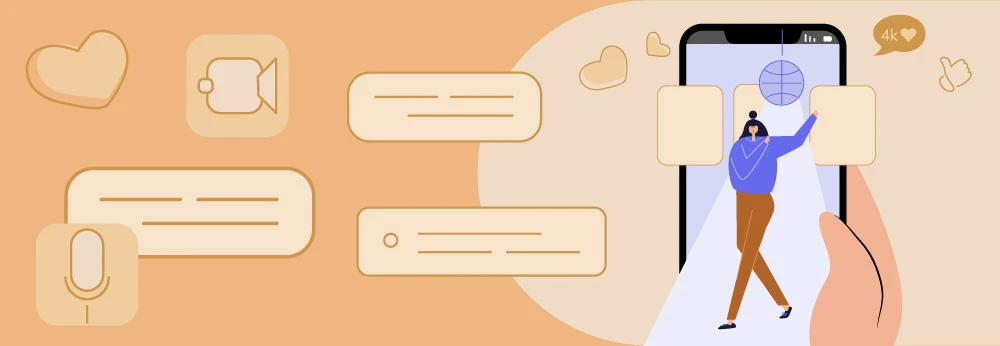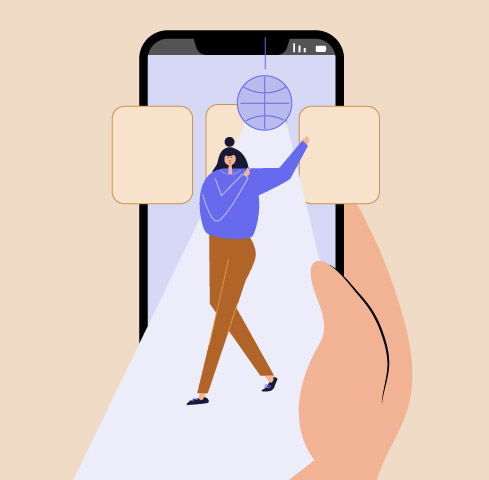.jpg?2026-02-17T14:47:30.411Z)
When Leroy Merlin ran out of hands, InAppStory became the extra ones

The Power of Stories in Health Apps: A Deep Dive into Flo Health Inc.'s Success
Karina
Author @ InAppStory
When we talk about champions in the realm of female health and well-being, Flo Health Inc. undoubtedly merits recognition. With a robust digital platform, Flo Health Inc. has made significant strides in making women's health management more accessible and interactive. From their humble beginnings, they've evolved into a key global player in the sector, known for their constant innovation and user-centric approach.
One such innovation that stands out is the incorporation of Stories into their mobile application, a feature they adopted as early as four years ago. Taking a leaf from social media platforms, they repurposed the concept of 'Stories' to suit the healthcare landscape, creating an interactive and engaging content stream for their users. These in-app Stories have revolutionized how Flo interacts with its users, making it much more than just a mobile application.
But, as with any innovation, it didn't come without its fair share of challenges. In the subsequent sections, we'll delve deeper into these challenges, the evolution of Flo from a period tracking app to a comprehensive health partner, and how Stories serve as a powerful tool in navigating these complexities. Get ready to dive into a narrative of innovation, personalization, and the power of Stories in the world of healthcare applications.
The Evolution and Challenges of Flo App

Flo started with a simple, yet vital premise: to aid women in tracking their menstrual cycles. Over time, this digital solution has transformed and grown, just like its user base. Today, it's more than just a period tracker; it's a comprehensive health partner that provides support to women during various stages of their lives, including pregnancy.
However, this evolution hasn't been devoid of challenges. One significant hurdle lies in the complexity of health data interpretation. Flo operates with a multitude of data and metrics, gathered both from the user's input and expert medical sources. Translating these complex, often interrelated data sets into comprehensible, actionable insights for the everyday user is a massive undertaking.
In addition to this, the app draws upon the knowledge of hundreds of medical experts and institutions. While this extensive information pool certainly adds value, it also poses a challenge: the content must be relevant and delivered at the right moment based on each user's tracker data, logged symptoms, and other insights. A one-size-fits-all approach doesn't work when it comes to health; content must be personalized and timely to be truly effective.
Lastly, there's an inherent need for the app to do more than just inform; it must also educate and provide supportive content when it's most needed. From helping users understand their bodies better to providing emotional support during trying times, the app has the challenging task of being a consistent, reliable ally in the user's health journey.
These challenges underscore the need for a unique, empathetic, and data-driven approach to user engagement - and that's precisely where Flo's innovative use of Stories comes in. In the next section, we'll discuss how Stories act as a bridge, connecting the world of data with the world of users, in a way that's engaging, empathetic, and easy to understand.
The Solution: Incorporating Stories into the App
In the world of mobile applications, stories have become a popular feature, primarily used to deliver short, engaging content that resonates with users. Flo Health Inc. harnessed this concept and integrated it into their health platform, turning it into a powerful tool to communicate complex health information in an accessible way.
Stories serve as a brilliant way of bridging the gap between users and the intricate world of health data. They create an emotional connection with the user, crafting a sense of companionship and credibility. Health information, often daunting in its complexity, is delivered in bite-sized, digestible pieces through these Stories, making it easier for users to comprehend and act upon.
Moreover, Stories add a human touch to the app. It’s no longer just an application filled with data and tracking features, but a platform that demonstrates empathy and care about each user's wellbeing. This narrative format allows the app to step beyond its role as a tracker and transform into a caring companion that walks alongside the users in their health journey.
However, leveraging Stories to their fullest potential requires a strategic approach. It requires in-depth understanding of user needs, behaviors, and preferences, enabling the crafting of personalized content. But with the right strategy and investment, this approach can significantly enhance user engagement and retention.
The Advantages of Stories in Health Apps

Incorporating Stories in health apps can bring numerous advantages that transcend beyond the aesthetic appeal of the interface. Primarily, Stories provide a versatile format to deliver diverse content that ranges from expert advice to supportive messages, always keeping the communication fresh and engaging for the users.
- Personalization and Segmentation: Every user is unique in their health journey, and Stories offer an excellent opportunity to cater to these individual needs. With the right personalization and segmentation strategies, Stories can deliver content that's specifically tailored for each user, considering their input data, symptoms, and health goals.
- User Engagement and Retention: Stories are not only informative but also engaging, adding an element of interactivity that is often missing from conventional health apps. They invite users to engage with the content, keeping them hooked to the app, which ultimately enhances user retention.
- Simplified Health Education: Health information can often be overwhelming and challenging to digest. Stories simplify this process by breaking down complex medical information into bite-sized, easy-to-understand content.
- Emotional Connection and Credibility: Stories craft a narrative that connects with the user on an emotional level. This emotional connection, paired with the app's ability to deliver accurate health advice, enhances the app's credibility in the eyes of the users.
- Gamification and Interactive Experience: Stories work seamlessly with other interactive features, such as gamification. Together, they create a unique user experience that's both fun and beneficial, making health management feel less like a chore and more like an engaging journey.
Using Stories for these purposes in health apps is a pioneering step, and Flo Health Inc. has successfully demonstrated its advantages. In the next section, we'll look at specific examples of how Flo has leveraged Stories to enhance their app's usability and user satisfaction.
Conclusion
The introduction and successful integration of Stories in mobile apps, particularly in health apps like Flo, marks a significant innovation in the digital healthcare industry. Stories not only add an appealing layer of interactivity to these apps but also create a bridge between users and the complex world of health data.
As we have seen in the case of Flo Health Inc., the utilization of Stories in health apps transcends traditional boundaries of user engagement and retention. They enable apps to deliver personalized, timely, and relevant content, turning them into more than just a tool; they become companions that guide users thrugh their health journeys.
Stories have also proven instrumental in simplifying health education. They break down complex medical information into digestible, bite-sized pieces, making the process of understanding and acting upon health advice much easier for the average user. Furthermore, the emotional connection and sense of credibility that Stories foster have been crucial in building a reliable and empathetic relationship between the app and its users.

